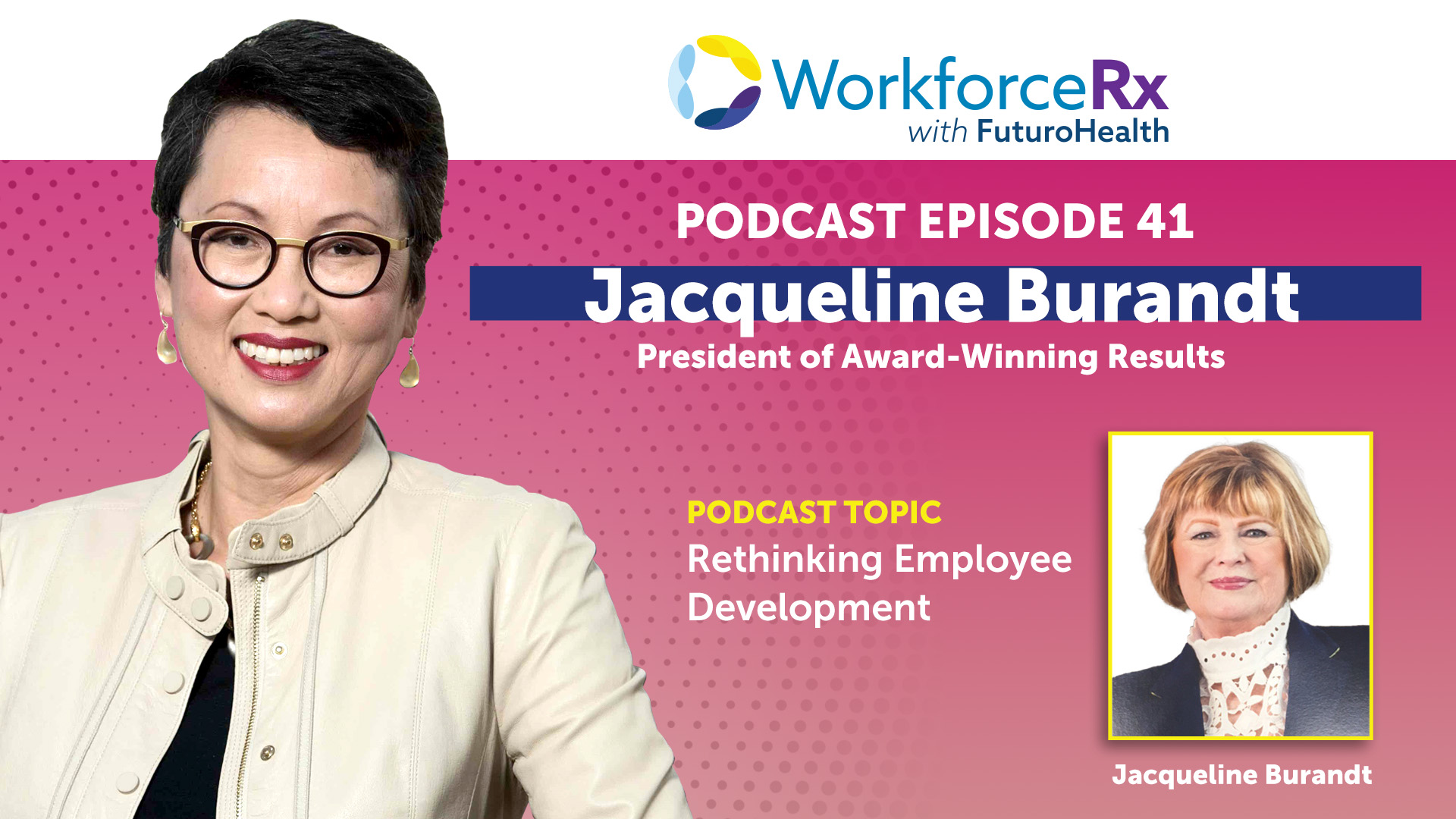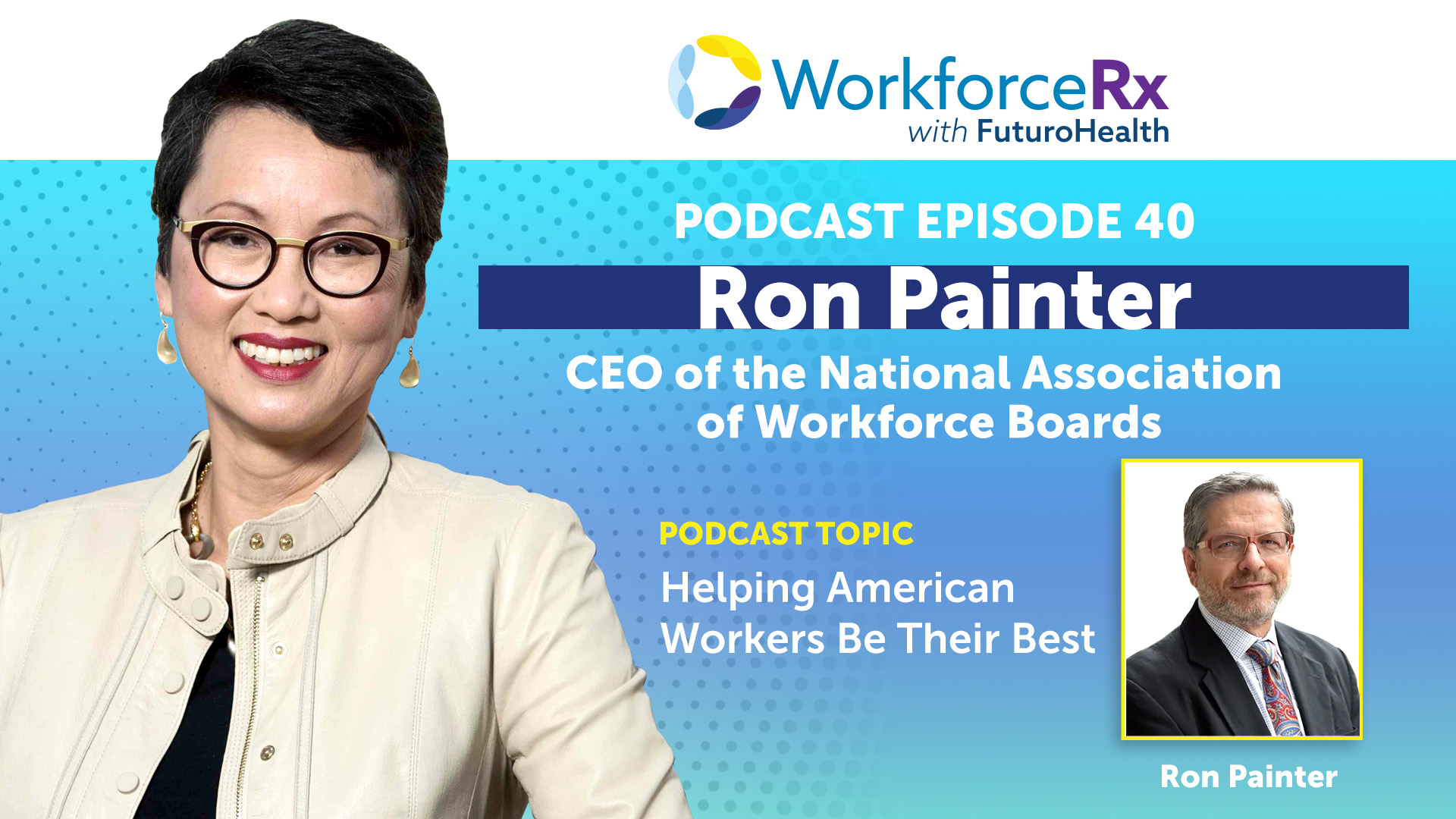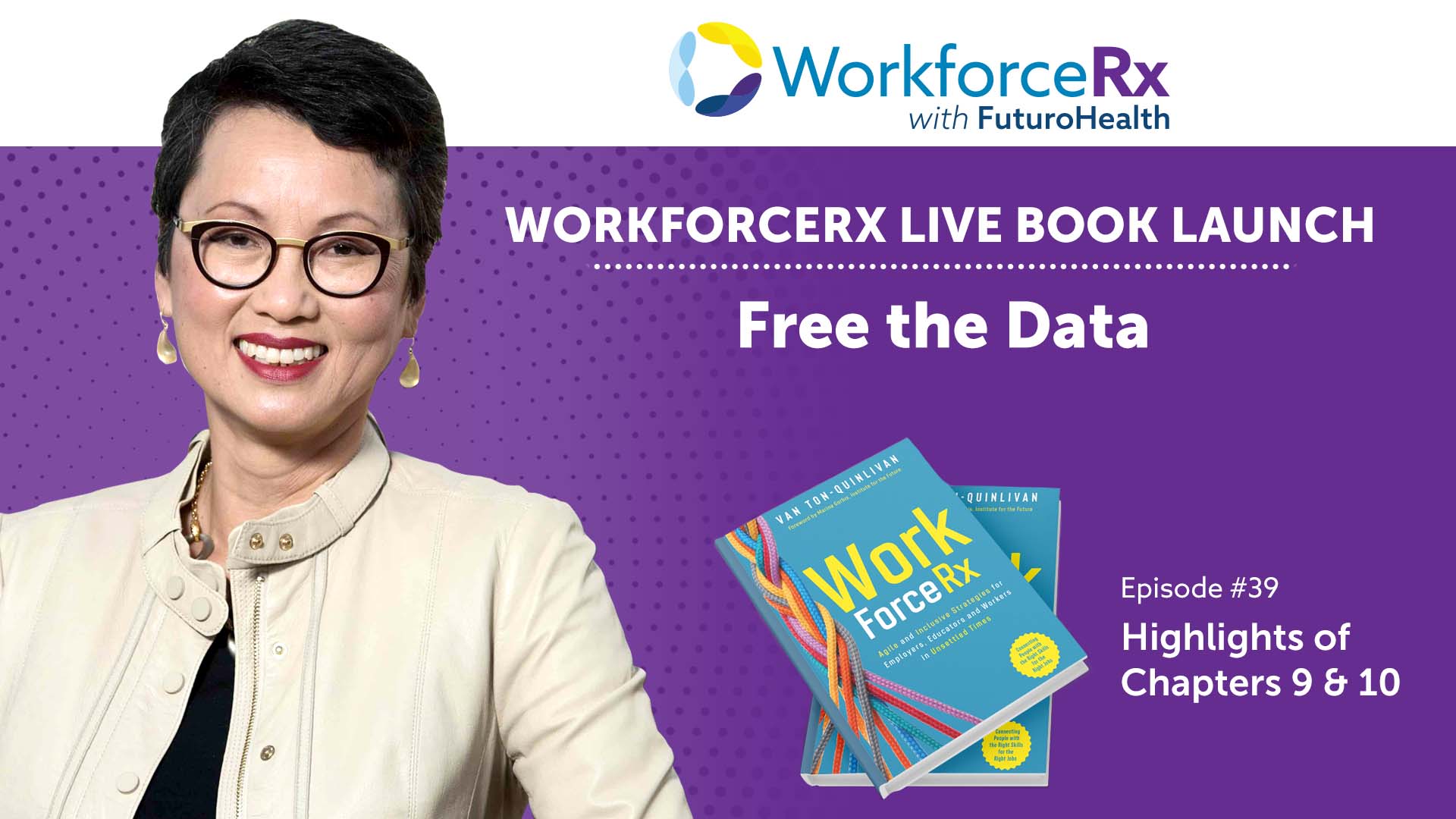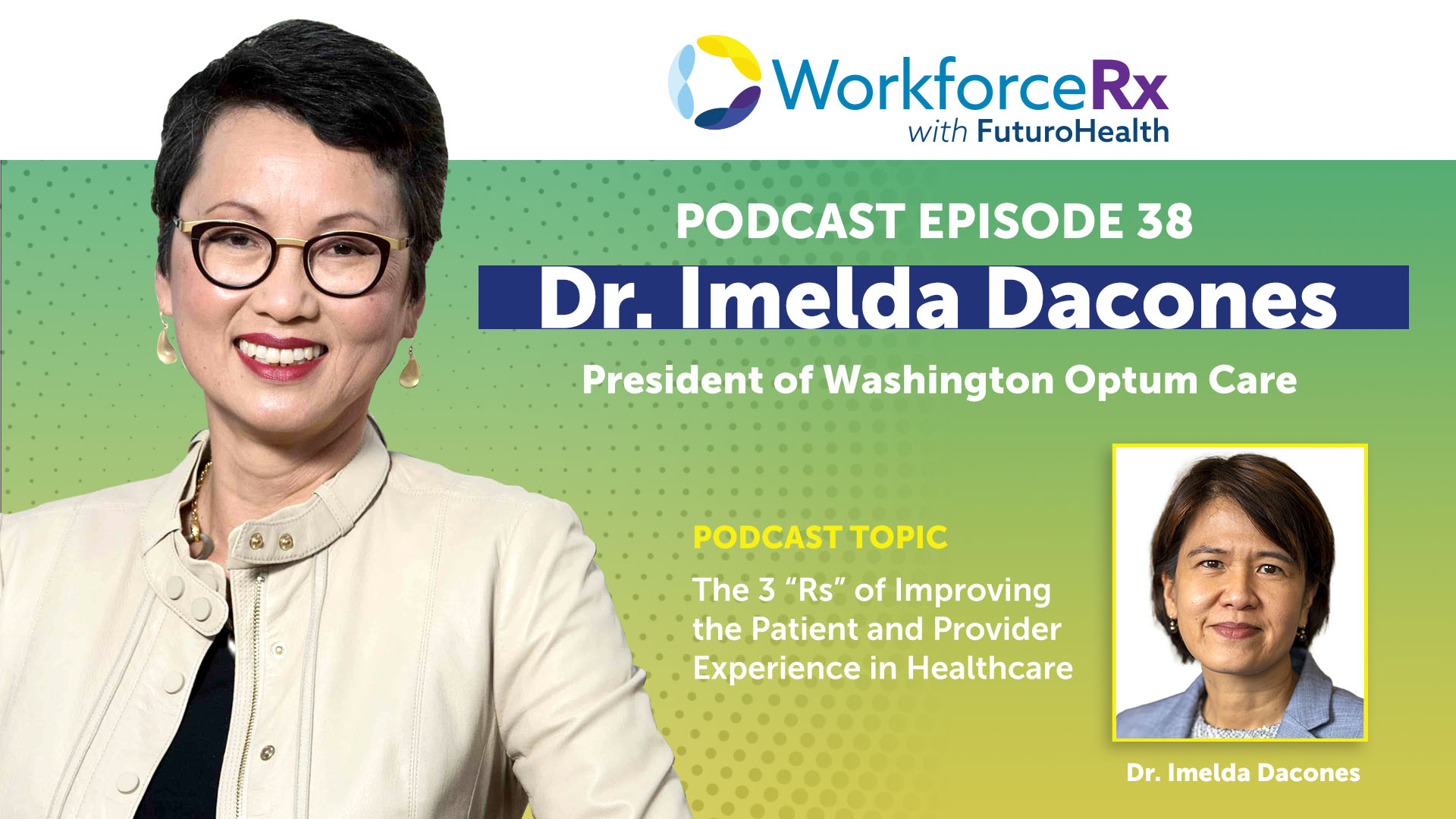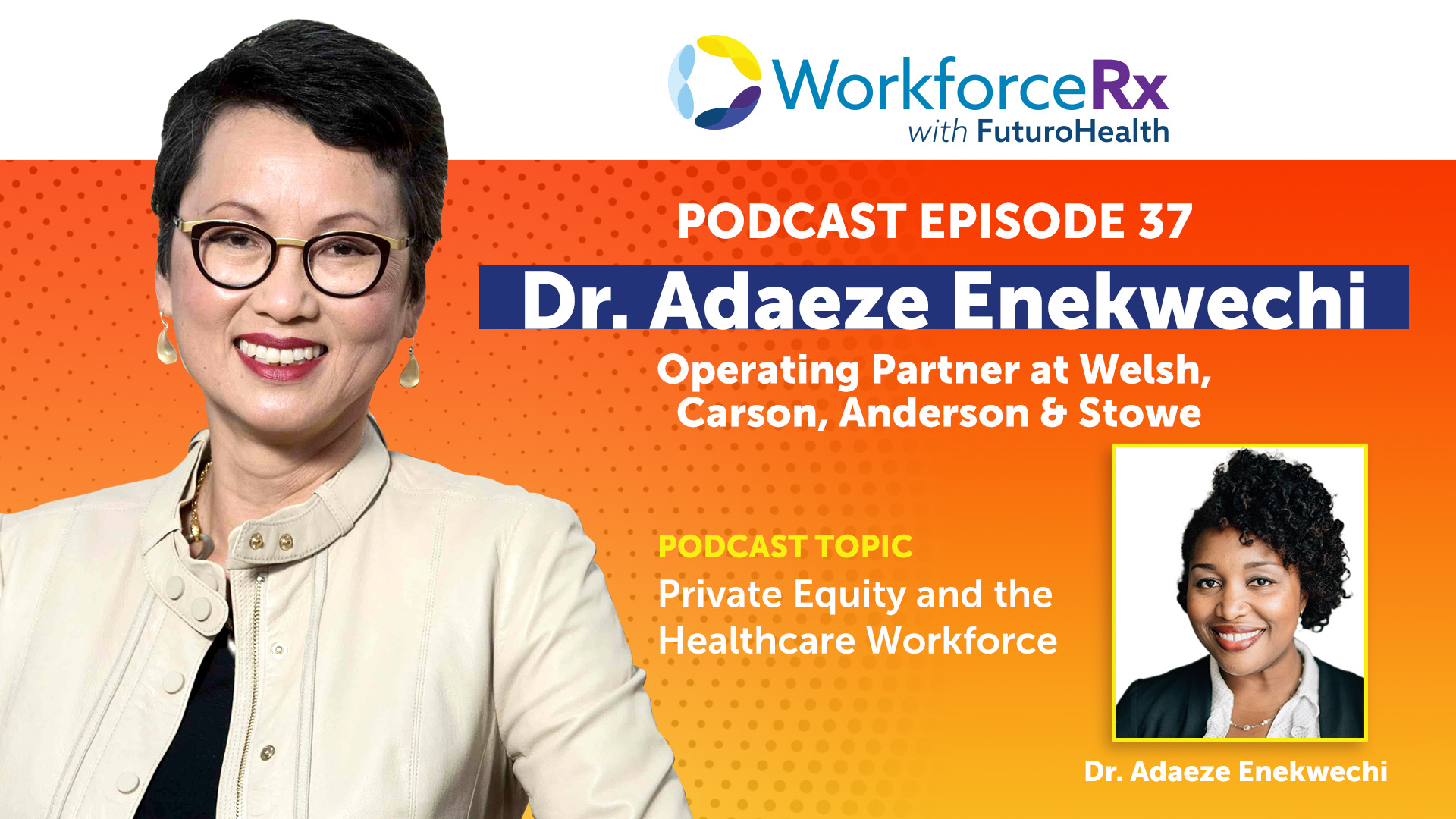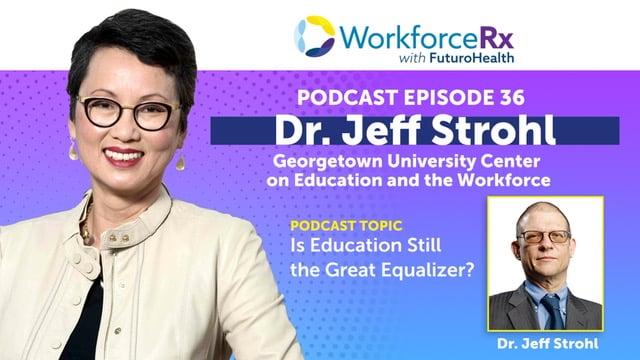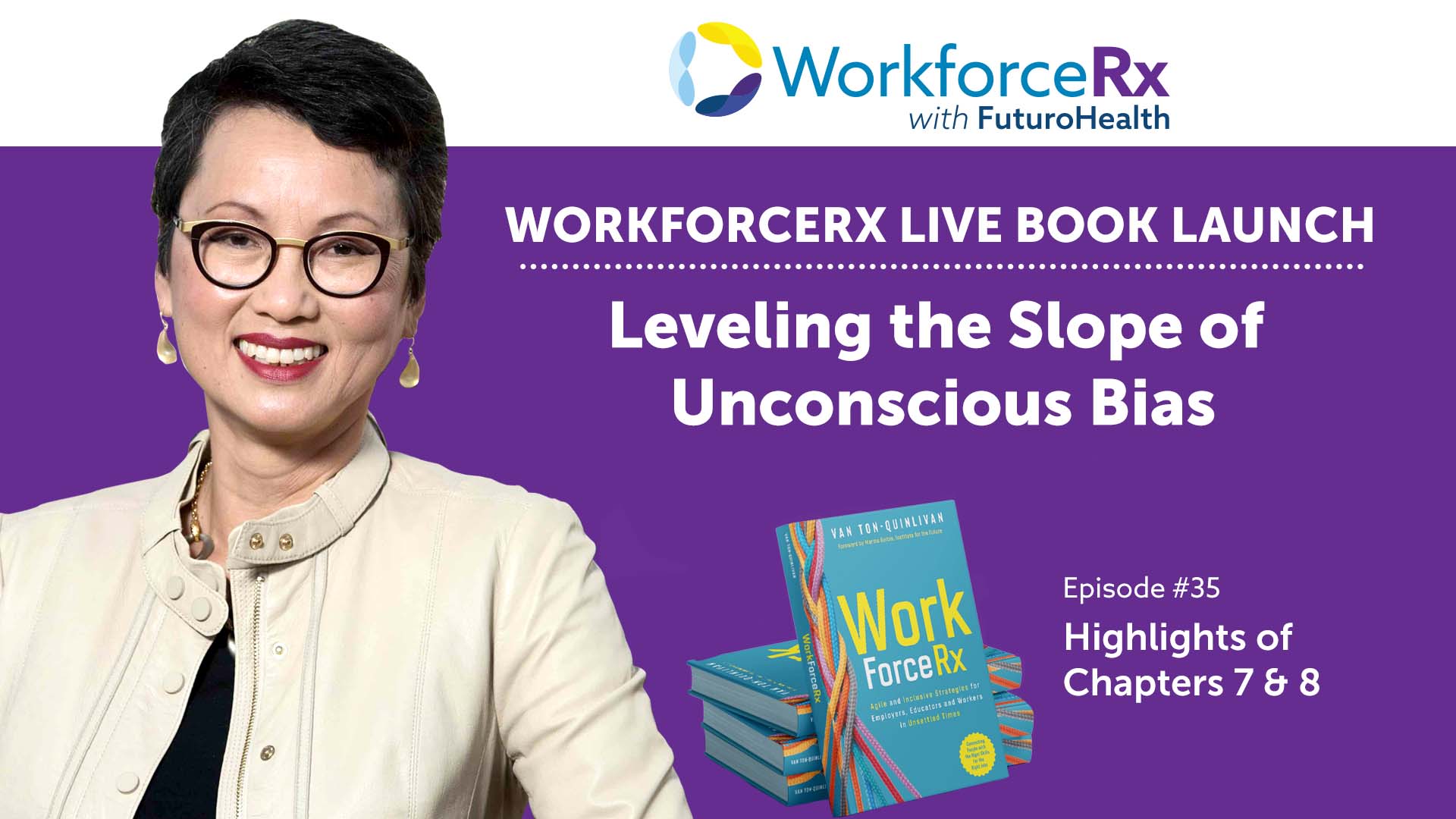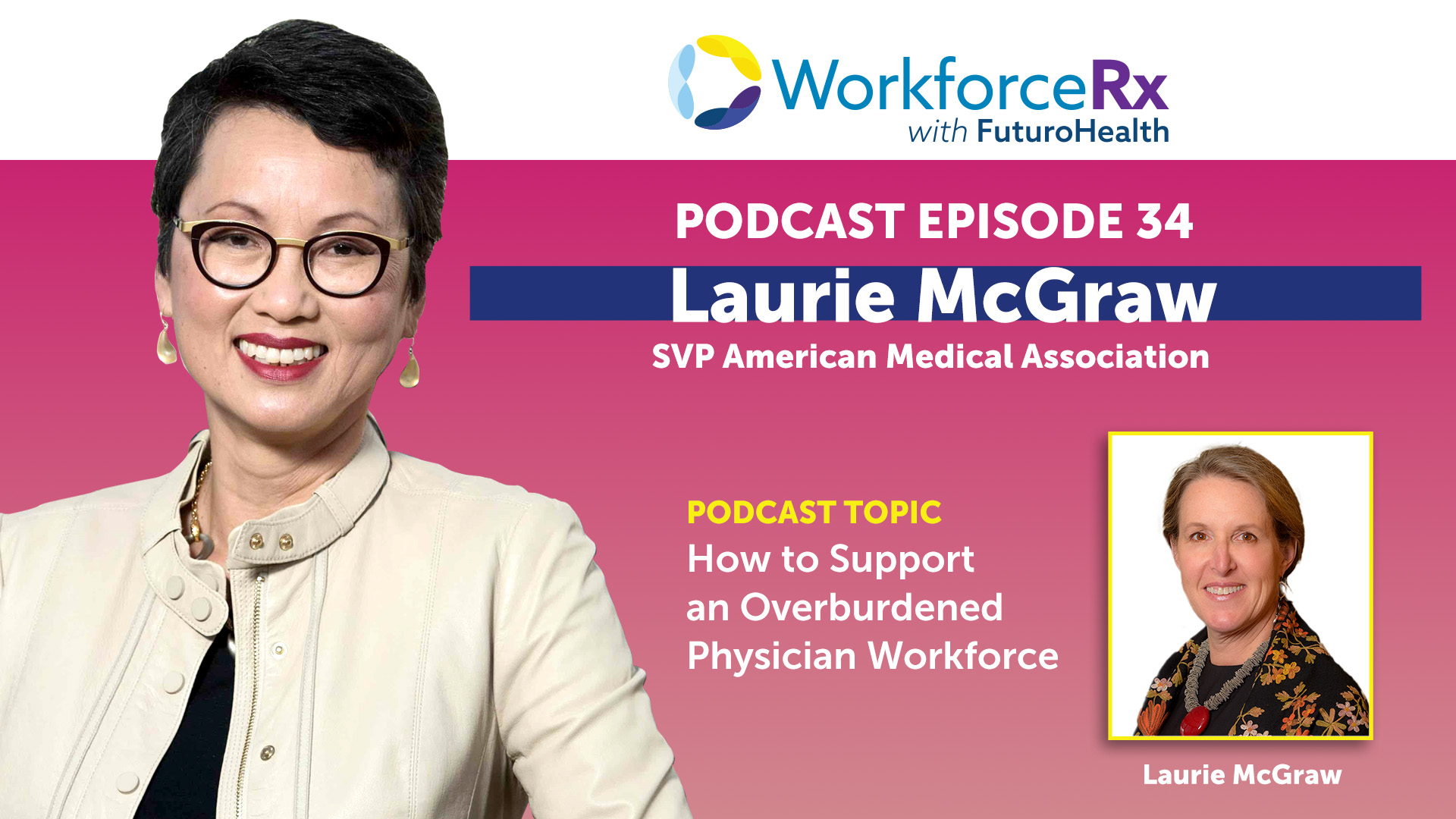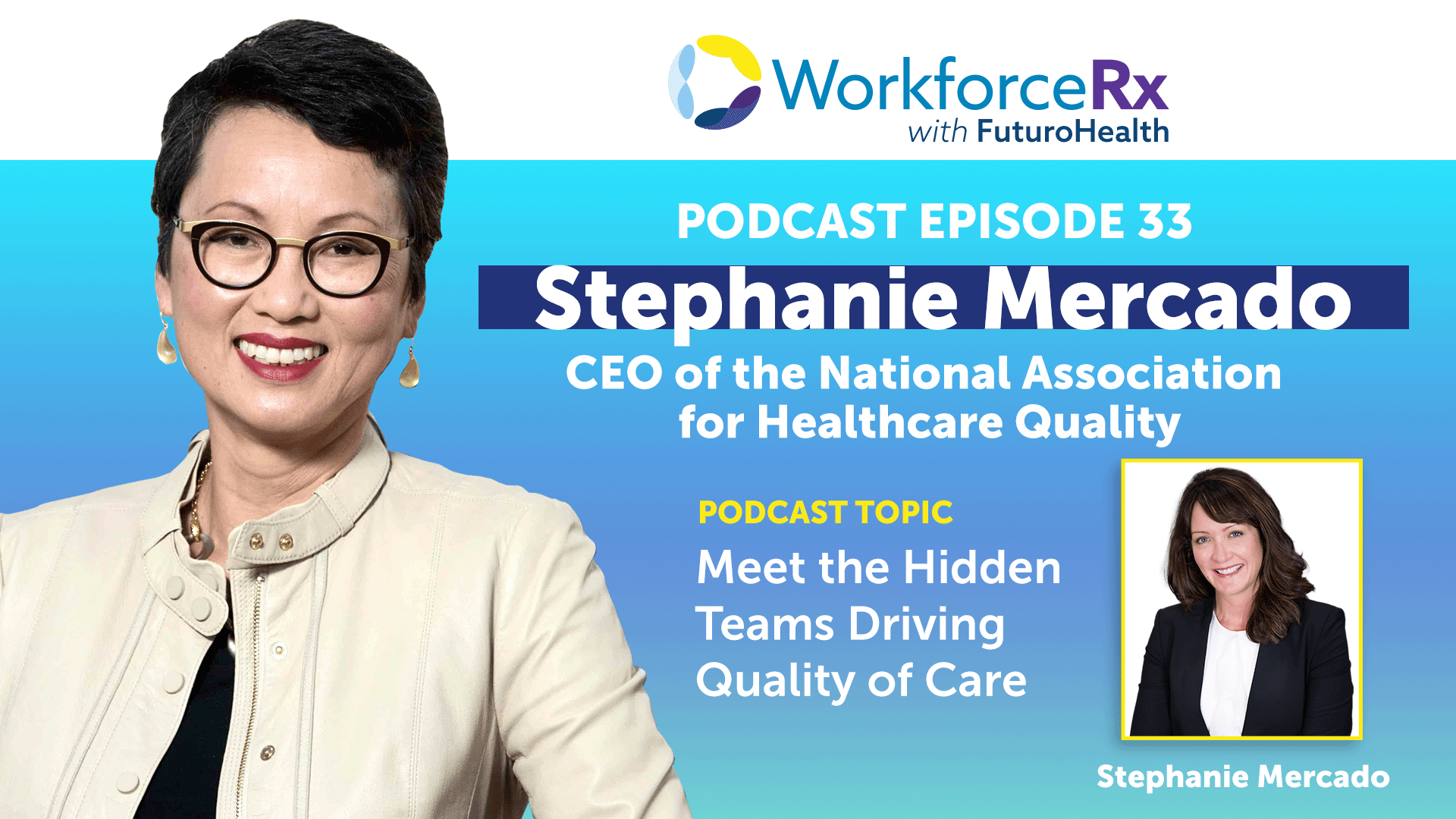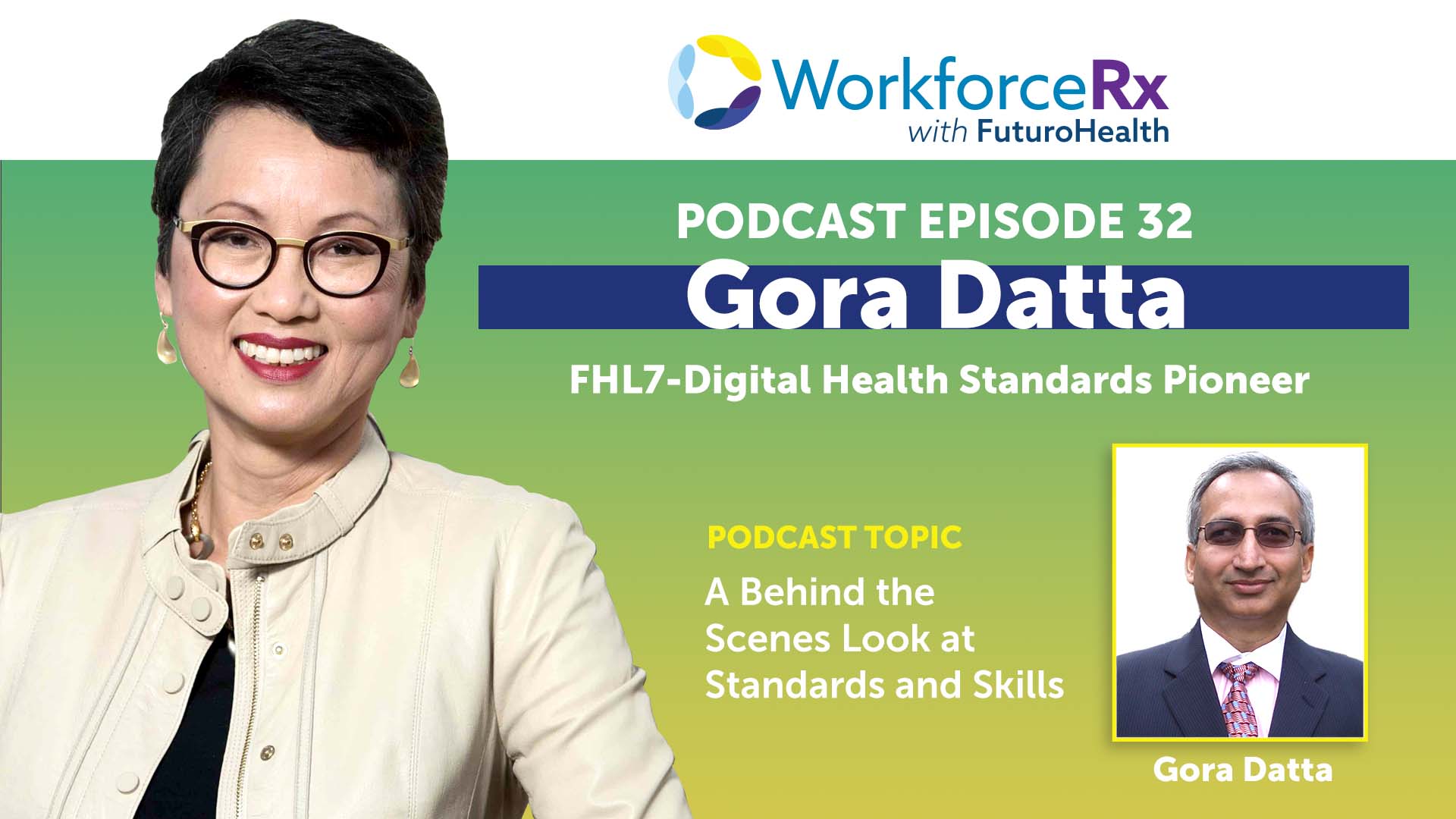Obstacles – from language proficiency to digital literacy to family care – make it difficult for adults to get on, and stay on, an education path towards a career they desire. Our guest on this episode of WorkforceRx, Jacque Burandt, spent decades at University Health System in San Antonio, Texas, breaking down those barriers and is here to share her recipe for creating and sustaining successful upskilling and reskilling programs. As she tells Futuro Health CEO Van Ton-Quinlivan, first and foremost is partnering with community organizations. Very few people have the budget to invest in lots of expensive training so employers should seek out groups that can help them out, says Burandt, who is now president of Award-Winning Results, a firm that focuses on transforming organizations through people development and gaining recognition for employees. A key benefit to these collaborations is that the community partner can often help with the “wraparound” services that make it easier for employees to attend classes. Tune in for many more tips and strategies in this wisdom drop from Jacque about getting the buy-in of supervisors, investing in awareness of the offerings, and the importance of celebrating successes so that building your own internal talent pipeline is no longer just a pipe dream.
Continue readingRon Painter, CEO of the National Association of Workforce Boards: Helping American Workers Be Their Best
As the unprecedented misalignment in the U.S. labor market between employers and workers continues, it’s a good time to take a look at the extensive federal infrastructure in place to support people seeking jobs and skills. Millions of Americans access 2,400 American Job Centers located throughout the country and its territories every year, which are powered by a network of 500 Workforce Development Boards. On today’s episode of WorkforceRx, Futuro Health CEO Van Ton-Quinlivan sits down with Ron Painter, CEO of the National Association of Workforce Boards, to explore the vital role they play in advancing economic opportunity. “Workforce Boards bring together the players you need in that region — housing, transportation, economic development, community-based organizations, faith-based organizations — that’s a unique mix wherever you are. There’s a whole lot that makes that equation work.” Check out this informative discussion to learn how communities are leveraging this network to bring about economic opportunity, why local Boards need more flexibility, and to understand why Painter is optimistic about meeting the unprecedented challenges facing employers and workers.
Continue readingWorkforceRx Live Book Launch: Free the Data
Van Ton-Quinlivan, CEO of Futuro Health and host of the show, is also author of the best-selling book, WorkforceRx: Agile and Inclusive Strategies for Employers, Educators and Workers in Unsettled Times. In this episode, Van welcomes leading workforce and economic development experts to discuss the strategies and insights from Chapters Nine and Ten that resonated most with them. Check out their lively discussion about freeing and sharing data within an organization to guide improvements; building infrastructure to help gig workers thrive; the role of labor unions in scaling solutions to workforce challenges; adopting a shared ownership model to overcome inequality in income and assets, and much more from this powerful new playbook for the future of work.
Joining Van are: Omid Pourzanjani, Superintendent and President of San Joaquin Delta College; Anthony Dalton, Vice President & Chief Data Scientist at Futuro Health; Kathy Booth, Project Director at WESTED; Ann Volk, Senior Director at Alvarez & Marsal; Sara Skvirsky, Research Director at the Institute for the Future; Dave Regan, President of SEIU-UHW; Howard Brodsky, CEO of CCA Global and Lenny Mendonca, Former Chief Economic and Business Advisor for the State of California.
Dr. Imelda Dacones, President of Washington Optum Care: The 3 “Rs” of Improving the Patient and Provider Experience in Healthcare
What do all of the changes in healthcare wrought by the pandemic mean for the future healthcare workforce? On today’s episode of WorkforceRx, Futuro Health CEO Van Ton-Quinlivan draws out thoughtful answers from someone with a broad and deep view of the healthcare system. Dr. Imelda Dacones has been confronted with all of these changes — many of which were brewing before the pandemic — over decades as a physician and senior leader at large healthcare organizations in Oregon and Washington. She’s also a nationally recognized leader in healthcare delivery innovation, addressing social determinants of health, and the health impacts of climate change, among other issues. Her prescription for change? Reimagine the healthcare team, reengineer the patient visit, and reinvigorate providers. “We need to reinvent care altogether for the patients we serve but also for ourselves as providers, because there just are not going to be enough nurses, doctors and medical assistants coming into the future.” Don’t miss this comprehensive look at the challenges and opportunities in healthcare from integrating with community organizations to leveraging home care to keeping up with shifting skillsets. Find out, too, about the Quadruple Aim and how the healthcare industry can work to reduce its waste footprint in light of climate change.
Continue readingDr. Adaeze Enekwechi, Operating Partner at Welsh, Carson, Anderson & Stowe: Private Equity and the Healthcare Workforce
“I did not ever think of private equity as a career option for me,” admits Dr. Adaeze Enekwechi, and not only because she saw it as a male-dominated profession. The former head of health at the Office of Management and Budget under President Obama and Ph.D. in health management expected to make a difference through public policy. But as an Operating Partner at Welsh, Carson, Anderson and Stowe, she’s having an impact from a different perch. “We look at assets or companies to build that would make a meaningful contribution in whatever specific healthcare ecosystem we’re interested in investing in,” she tells Futuro Health CEO Van Ton-Quinlivan. “Our philosophy is not to just put money towards something and collect. We’re looking for opportunities to build something meaningful.” One current example is finding solutions to the nursing shortage and the painful budget crunch hospitals are enduring to pay for traveling staff. Investing in contingency staffing companies would earn a return, she says, but does nothing to solve the problem. A more useful target, she says, is leveraging technology to optimize the existing workforce. Adaeze shares examples of other issues she’s looking at through a private equity lens including racial inequities in care, social determinants of health, and what the training needs are as more care is being provided in the home. Check out this thoughtful episode of WorkforceRx in which you’ll also find out why this nationally respected healthcare leader thinks retail giants like Walmart and CVS should be applauded, and which two healthcare issues you should keep a close eye on in the coming months.
Continue readingDr. Jeff Strohl, Georgetown University Center on Education and the Workforce: Is Education Still the Great Equalizer?
“While we believe that education is a great equalizer, in fact, it is not. There are structural inequalities in place that hold back the most talented low-income and minority youth,” says Dr. Jeff Strohl, whose research at the Georgetown University Center on Education and the Workforce focuses on equity and socio-economic differentials in outcomes. And that’s not all he has to share with Futuro Health CEO Van Ton-Quinlivan on the subject of equity in education, training and the labor market as you’ll hear in this revealing episode of WorkforceRx. Improving race and gender inequities, he says, requires more investments in school-based counseling and doing a better job at “expectational formation” in underrepresented communities. “Young people need better examples about what the workplace looks like so people can find an interest in different fields because if you didn’t grow up in a science-based home, why would you be interested in STEM?” Strohl pinpoints other steps to create a stronger, more inclusive workforce including more agility by higher education in meeting employer needs, putting training on a level playing field with education, enhancing work-based learning opportunities, addressing inherent biases in higher education and improving transparency in the short-term credential space. Don’t miss this chance to hear the deeply-informed perspective of a key resource for stakeholders and policymakers alike.
Continue readingWorkforceRx Live Book Launch: Leveling the Slope of Unconscious Bias
Van Ton-Quinlivan, CEO of Futuro Health and host of the show, is also author of the new best-selling book, WorkforceRx: Agile and Inclusive Strategies for Employers, Educators and Workers in Unsettled Times. In this episode, Van welcomes leading workforce and economic development experts to discuss the strategies and insights from Chapters Seven and Eight that resonated most with them. Check out their lively discussion about how to stop pitting diversity against workforce quality; integrating recruitment, screening and training; making upskilling the new norm; taking a “credential-as-you-go” approach and much more from this powerful new playbook for the future of work.
Joining Van are: Holly Zanville, Co-Director of Program on Skills, Credentials and Workforce Policy at the George Washington Institute of Public Policy; John Brauer, Executive Director for Workforce & Economic Development at the California Labor Federation; Shannon Lucas and Tracey Lovejoy, Co-Chief Executive Officers of Catalyst Constellation; Paul Granillo, President & CEO, Inland Empire Economic Partnership; Linda Wah, Trustee, Pasadena City College; Gustavo Herrera, CEO of Arts for LA.
Continue readingLaurie McGraw, SVP American Medical Association: How to Support an Overburdened Physician Workforce
The pandemic brought a lot of new stressors for physicians, but even before COVID, there were major trends impacting doctors including burnout, adjusting to new technologies, and accommodating new roles for mid-level providers. On this episode of WorkforceRx, Laurie McGraw of the American Medical Association provides a close look at the challenges facing physicians and the support they need to overcome them. As the AMA’s senior vice president of Health Solutions, McGraw, who has a deep background in health IT, has a special focus on helping physicians integrate new technology into clinical practice. “Physicians love innovation, but if new technologies are not implemented well, it only leads to a negative cycle of more burden and more disruption which is a real problem in healthcare today.” Check out this illuminating conversation with Futuro Health CEO Van Ton-Quinlivan that explores the best ways to augment the physician workforce to meet growing demand for care, harnessing opportunities in digital health, and how — with her podcast Inspiring Women and other efforts — McGraw is encouraging women to take on leadership roles in healthcare and beyond.
Continue readingStephanie Mercado, CEO of the National Association for Healthcare Quality: Meet the Hidden Teams Driving Quality of Care
You might think improving healthcare quality is largely in the hands of the clinicians providing the care, but much of this challenging work is actually done behind the scenes by professionals who focus on quality indicators. On this episode of WorkforceRx, we get an inside look at this critically important workforce from Stephanie Mercado, CEO and Executive Director of the National Association for Healthcare Quality (NAHQ). Since assuming the role eight years ago, she has focused on standardizing competencies for the profession and increasing awareness of its value. “Healthcare needs problem solvers and that’s what people who work in quality do. They understand systems, processes, and structure, they have the toolkit for quality, and they have that spirit of improvement.” That’s particularly important right now, Mercado says, because key quality metrics have slipped during the pandemic. Check out this revealing conversation with Futuro Health CEO Van Ton-Quinlivan to learn about the certifications NAHQ offers, the qualities that help people succeed in this overlooked but promising career track, and what the future holds for quality professionals as healthcare challenges mount.
Continue readingGora Datta, FHL7-Digital Health Standards Pioneer: A Behind the Scenes Look at Standards and Skills
The rapidly growing presence of digital technologies in healthcare — from telemedicine, to artificial intelligence, to at-home monitoring devices — is creating demand for a skilled workforce to maximize their potential. It is also accelerating the need for common standards to ensure the compatibility and integration of all of this tech. On this episode of WorkforceRx, we turn to Gora Datta who is perfectly positioned to sort through the current and future implications of these opportunities and challenges. Gora is an internationally acknowledged expert on digital health, a key player in setting technical standards for the industry, and he’s also involved in healthcare technology workforce initiatives. Join Futuro Health CEO Van Ton-Quinlivan and Gora Datta as they explore what skills are needed for workers in this space, how home-based care will revolutionize the healthcare industry, and the role robots and drones may play in this new regime. As a bonus, you’ll get a fascinating look at the historical implications of tech standards including the width of railroad tracks, the fittings on fire hydrants and the frequencies for Wi-Fi systems.
Continue reading
